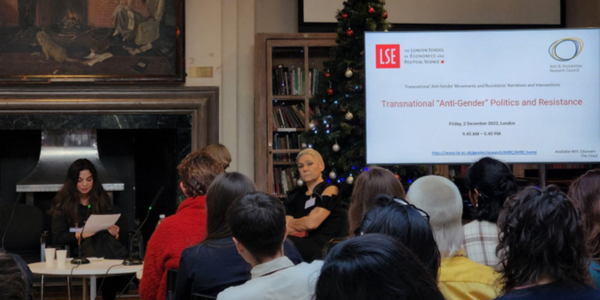by Sumi Madhok
This blogpost is based on comments given at the following events: AHRC Network workshop on Transnational Anti-Gender Politics: Narratives and Resistance held at the LSE on 2 December 2022; the SOAS Gender Studies Conference 4 February 2023 and the Pathfinders grand Challenge on Inequality Panel Solidarity in Action: Countering anti-feminist trends around the globe, 13 March 2023, NYU Centre on International Cooperation.
Photo by Carine Roos, under Creative Commons By-SA. Published with permission.
Yet again, we assemble in perilous times. These are the times of intense culture wars and of moral panics around sexual rights and gender identities. Around the globe, right wing statism and its motley crew of supporters across intersecting spectrums, divides and political affiliations is successfully and terrifyingly mobilising anti-feminism and in particular, anti-gender as its central political and policy platform to not only spectacular political effect but also deadly consequences. Everyday news wires bring in new stories of this backlash, whether it is Russia blaming imperialist forces for spreading LGBTQI rights and destroying the unique Russian civilisation, culture and nationhood or the Indian government rehashing 1980s anti-gay narratives to ban transgender people, gay men and women sex workers from donating blood and opposing same-sex marriage in the name of protecting societal values of the country. Across the border into neighbouring Pakistan, Marvia Malik, the country’s first transgender anchor has recently survived an assassination attempt and farther afield in Hungary, gender studies departments have been shut down entirely or renamed ‘family studies’ departments or indeed in Brazil where since 2014, 200 legislative proposals have been introduced to ban “indoctrination” or “gender ideology” in Brazilian schools.
And, here in the UK, crimes against transgender peoples have seen the biggest increase and are up 56% from last year; and transphobia and anti-critical race theory have now become a part of standard parliamentary speak by government ministers. In July last year, a UK Government-organised multinational statement committing to the fundamental rights of women and girls was revised to remove references to ‘sexual and reproductive health and rights’ and ‘bodily autonomy’. And, currently, all the occupants of the ‘four great offices of the state’ — home office, foreign office, the PMO, and the Chancellor of the Exchequer have refused to publicly support safe abortions in England. And, most recently on 16 January this year, the British Government deployed its ‘veto power’ (for the first time ever) i.e. section 35 of the Scotland Act 1999 to block the gender recognition law passed by the Scottish Parliament. It beggars belief that in the midst of the UK’s greatest cost of living crisis since the 1950s going on, with inflation a 40-year high at 10.4% and 2.3 million vulnerable households missing an essential payment in January, and thereby exposed to deleterious precarity and poverty, the energies of the Conservative government are so comprehensively concentrated on stoking frenzied culture wars and removing rights protections from trans peoples.
Now, of course, the forms and modalities of these anti-gender mobilisations are distinct in different parts of the globe. There are, however, clear global designs and patterns of anti-gender politics that are appearing in different parts of the world. For instance, there are certain tropes which are commonly mobilised in these culture wars. These include the by now familiar threats to ‘traditional and cultural values’, to ‘the family’, and to deeply held ‘religious beliefs’. Increasingly, though, we are also seeing the appropriation of the languages (but not the framework) of ‘anti-imperialist’ and ‘decolonial’ discourses in order articulate opposition to anti-gender politics as part of ‘foreign’ cultural values!
These patterns also indicate that culture wars are no longer limited to electoral cycles, when they are regularly wheeled out to rouse the faithful, but are increasingly now part of nationalist manifesto politics with political parties of the right rushing to pass legislation to institutionalise their regressive and openly discriminatory politics. The alarming rate at which rights are being stripped from peoples is, however, not the only thing that is being institutionalised; what is also being institutionalised is the official and statist blocking off of the long and difficult histories of people’s struggles to gain these rights from public memory, recognition and knowledge. We are also seeing a confident and an unhesitant zero-sum approach to rights in anti-gender movements i.e. my rights can only exist if you don’t have yours. This kind of discourse is inherently exclusionary and based on long histories of exclusion and oppression founded on denying the humanity of various groups. The super swift rolling back of hard-won rights is not happening alone, of course; what we are also witnessing is an institutional erasure of the histories of political struggles by marginalised groups, which in part explains the political zeal with which the teaching of critical race scholarship is under attack, as is that of empire, as are abortion rights, along with the rights of trans and non-binary people. They are subjects of right wing attack because they constitute and embody epistemic challenges to the foundational methodological whiteness, the anti-blackness and the biological centrism of institutional and legal structures. They also openly challenge the exclusionary philosophical frameworks that constitute the human and humanity as well as the ‘political economies of domination’ that sustain it. This super swift rolling back of hard-won rights and refusal of histories of struggles is yet another reminder of the fragile and precarious nature of rights of the marginalised—perennially in danger of being wrested away by the powerful.
And, it is also a reminder of the importance of staying hypervigilant.
But being vigilant is not to be downhearted. For it’s also the case, that there are inspirational and heroic stories of growing resistances against this everyday onslaught on so many people’s rights to exist. These are stories that invariably go unheard in the present political climate which depends on an unremitting stoking of ‘culture wars’ for securing political mandates, relevance and legitimacy.
Transnational Resistance
In the summer of 2021, my colleague, Professor Clare Hemmings and I decided to systematically document the transnational nature of these ‘culture wars’ and resistance on the ground in the face of this onslaught. We put in a grant application to the AHRC for building a transnational network of scholars, activists and policy makers working on anti-gender mobilisations across the globe. And this is how the Transnational Anti Gender Movements and Resistance: narratives and Interventions Project was born. Our AHRC project challenges the provincial ‘single story’ of gender; it maps the narrative structures and political grammars of these transnational modalities of anti-gender mobilisations and of the resistance engendered against these formations in different locations. The network (and the project) is engaged in a twofold programme of work: of developing theoretical and conceptual tools and thereby, directly intervening in the knowledge production on anti-gender mobilisations. And, through carefully listening and learning — in respectful, ethical and non-extractivist ways – from political activists involved in building counter-hegemonic resistances to anti-gender politics, we hope to be able to build a solidaristic transnational gender politics that intervenes in the intellectual and political crises facing us.
And, there are ever increasing everyday struggles of resistance taking place on the ground: for example, there are the struggles over safe abortion in Latin America and the resulting massive win for abortion rights in Argentina. There is also the Brazilian Association of teachers pushing back at the statist bans on teaching sexuality and LGBTQI rights in secondary schools, and in early March 2023 in a press release on International Women’s day, the Women’s Democratic Front in Pakistan called for ‘peace, sovereignty and democracy from Kabul to Tehran’ and for ‘all feminist, socialist, nationalist, and secular democratic forces in the country to form solidarity and unite around the minimum agenda above for the liberation of the masses, women, oppressed nations, khawaja sira people, and people of persecuted religions, nations, ethnicities, and sects.’
I just want to underscore that this work all of us are engaged in is no easy one; it is one which takes place under difficult, coercive, political and oppressive institutional contexts and for many of us, at great personal cost. Many academic and state institutions, already so hostile and unwelcoming, have now further succumbed to right wing projects, removing protections from many already vulnerable groups in the name of free speech and protecting academic freedom.
Academic scholarship is often solitary. And this particular work that requires taking an alternative and principled stand in the face of this formidable institutional and political hostility and onslaught cannot be done alone or even by a few. The political stakes are very high and consequences of failure unthinkably deadly for many peoples. It is only through coming together in a solidaristic coalition based on what Edward Said called an ‘unbudgeable conviction in justice’, and by working with and through our differences, that we can forge an ethical, intellectual and political response to what is emerging as one of the biggest global questions of our times.
 Sumi Madhok is Professor of Political Theory and Gender Studies at the Department of Gender Studies, LSE. Her most recent book, Vernacular Rights Cultures: The Politics of Origins, Human Rights and Gendered Struggles for Justice is the winner of the Susan Strange Best Book Prize and the Sussex International Theory Prize. It also received the International Studies Association’s Lee Ann Fujii Book Prize ‘Honorable Mention’.
Sumi Madhok is Professor of Political Theory and Gender Studies at the Department of Gender Studies, LSE. Her most recent book, Vernacular Rights Cultures: The Politics of Origins, Human Rights and Gendered Struggles for Justice is the winner of the Susan Strange Best Book Prize and the Sussex International Theory Prize. It also received the International Studies Association’s Lee Ann Fujii Book Prize ‘Honorable Mention’.


